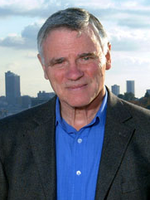Lee Hood

Keynote lecture
Will talk about: Systems Approaches to Neurodegenerative Disease: Catalyzing the Transformation from Reactive to Proactive Medicine
Dr. Hood’s research has focused on the study of molecular immunology, biotechnology, and genomics. His professional career began at Caltech where he and his colleagues pioneered four instruments—the DNA gene sequencer and synthesizer, and the protein synthesizer and sequencer—which comprise the technological foundation for contemporary molecular biology. In particular, the DNA sequencer has revolutionized genomics by allowing the rapid automated sequencing of DNA, which played a crucial role in contributing to the successful mapping of the human genome during the 1990s.
In 1992, Dr. Hood moved to the University of Washington as founder and Chairman of the cross-disciplinary Department of Molecular Biotechnology. In 2000, he co-founded the Institute for Systems Biology in Seattle, Washington to pioneer systems approaches to biology and medicine.
Most recently, Dr. Hood was elected to the Inventors Hall of Fame for the automated DNA sequencer. In addition, his lifelong contributions to biotechnology have earned him the 2006 Heinz Award in Technology, the Economy and Employment for his extraordinary breakthroughs in biomedical science at the genetic level; the prestigious 2004 Biotechnology Heritage Award; the esteemed 2003 Association for Molecular Pathology (AMP) Award for Excellence in Molecular Diagnostics; and the 2003 Lemelson–MIT Prize for Innovation and Invention. He was also awarded the 2002 Kyoto Prize in Advanced Technology, and the 1987 Lasker Prize for his studies on the mechanism of immune diversity.
He has published more than 680 peer-reviewed papers, received 26 patents, and has co-authored textbooks in biochemistry, immunology, molecular biology, and genetics. Dr. Hood is a member of the National Academy of Sciences, the American Philosophical Society, the American Association of Arts and Sciences, the Institute of Medicine and the National Academy of Engineering. He is one of seven (of more than 6,000 members) scientists elected to all three academies (NAS, NAE and IOM). Dr. Hood has also played a role in founding more than 14 biotechnology companies, including Amgen, Applied Biosystems, Systemix, Darwin, Rosetta, and the newly formed Hood diagnostic company, Integrated Diagnostics. He is currently pioneering systems medicine and the systems approach to disease.
The challenge for biology and medicine in the 21st century is the need to deal with its incredible complexity. One powerful way to think of biology is to view it as an informational science requiring systems approaches. This view leads to the conclusion that biological information is captured, mined, integrated by biological networks and finally passed off to molecular machines for execution. Systems approaches are holistic rather than atomistic—and employ both hypothesis-driven as well as discovery-driven approaches. Hence the challenge in understanding biological complexity is that of using systems approaches to deciphering the operation of dynamic biological networks across three time scales of life—development, physiological and disease responses. I will focus on our efforts at a systems approach to neurodegenerative disease—looking at prion disease in mice. We have just published a study that has taken more than 5 years—that lays out the principles of a systems approach to disease including dealing with the striking signal to noise problems of high throughput biological measurements and biology itself (e.g. polymorphisms). I will discuss how we have integrated six different types of data to generate powerful predictive network models. I will also discuss the emerging technologies that will transform medicine over the next 10 years—including next generation DNA sequencing, microfluidic protein chips, single-cell analyses and the capacity to generate stem cells for each individual patient. It appears that systems medicine, together with these transformational technologies and the development of powerful new computational and mathematical tools will transform medicine over the next 5-20 years from its currently reactive state to a mode that is proactive (P4)—medicine that is predictive, personalized, preventive and participatory. P4 medicine will have striking implications for healthcare costs as well as leading to a transformation of the healthcare industry. I will also talk about ISB strategic partnerships that will permit us to bring P4 medicine to the patient.


